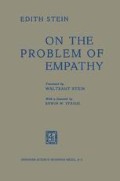Abstract
<101> So far we have considered the individual “I” as a part of nature, the living body as a physical body among others, the soul as founded on it, effects suffered and done and aligned in the causal order, all that is psychic as natural occurrence, consciousness as reality. Alone, this interpretation cannot be followed through consistently. In the constitution of the psycho-physical individual something already gleamed through in a number of places that goes beyond these frames. Consciousness appeared not only as a causally conditioned occurrence, but also as object-constituting at the same time. Thus it stepped out of the <102> order of nature and faced it. Consciousness as a correlate of the object world is not nature, but mind.
Access this chapter
Tax calculation will be finalised at checkout
Purchases are for personal use only
Preview
Unable to display preview. Download preview PDF.
Notes
On the relationship between fact and essence, factual and essential science, cf. Husserl’s “Ideen,” Chapt. I.
If this is protested here, naturally we always intend psychology as the natural scientific psychology prevailing today.
This is an interpretation very energetically advocated by Scheler.
Ideen über eine beschreibende und zergliedernde Psychologie.
Einleitung in die Geisteswissenschaften, p. 117.
Op. cit., p. 136 f.
Op. cit., p. 47.
In his earlier mentioned Sammelreferat (p. 48), Geiger has already stressed that reliving comprehension as the mere having present of something psychic must be distinguished from empathy. Naturally, he could not undertake a more detailed analysis at that point.
Similar distinctions have been made in modern psychopathology itself. Cf. Jaspers, “Über kausale und verständliche Zusammenhänge…”
For evidence of this view in the writings of well-known psychologists, see Österreich, “Phänomenologie des Ich,” p. 8 ff., cf. Natorp, too, Allgemeine Psychologie, p. 52.
Moreover, the same turning is also needed to “objectify” the correlate of an act of feeling. (Cf. Husserl’s Ideen, p. 66.) For example, it is accomplished by the transition from valuing, the primordial feeling of a value, to the value judgment.
I cannot entirely agree with Geiger when he denies sensory feelings all “participation in the ‘I’ ” (Phänomenologie des ästhetischen Genusses, p. 613 f.). If, as one must, one distinguishes the pleasantness of sensation from the pleasure it gives me, then I do not see how one can strike the “I”-moment from this pleasure. Of course, neither can I see Geiger’s distinction between pleasure and enjoyment insofar as it is based on participation in the “I.” Further, I cannot acknowledge that there is no negative counterpart to enjoyment (such as displeasure to pleasure, dislike to liking). It seems to me that a more detailed analysis should be able to expose suffering as the negative counterpart of enjoyment.
On the relationship between height and duration of values, cf. Scheler, op. cit., p. 492 ff.
Motiv und Motivation, p. 169.
Pfänder, op. cit., p. 168.
Pfänder, op. cit., p. 174.
Beiträge zum Studium der Individualität, p. 327 ff.
Meyer also notes the “necessity” of re-experiencing (Stilgesetz der Poetik, p. 29 ff.), but without keeping the lawfulness of meaning and causal lawfulness separated.
E.v. Hartmann in his Ästhetik has characterized the relationship between the psychophysical and the mental individual somewhat as we have tried to do it here (II, p. 190 ff., 200 ff.). For him every individual is an empirical realization of an “individual idea.”
Beiträge zum Studium der Individualität, p. 300.
There is a corresponding ontic lawfulness to which the correlate of these acts, the relationships of value and ought, are subject. (What is valuable ought to be.) But we need not go into this here.
See above, p. 115 f. [original pagination].
The fact that every individual and every one of his concrete experiences is plainly an experience happening only once does not contradict the typicalness of personal structure because the content of a number of streams of consciousness cannot in principle be the same.
Of course, Dilthey also conceives of the concept of type as at first not mental, but as psychic. This becomes very obvious in his description of the poetic type which, for the most part, consists of a definite peculiarity of psycho-physical organization: sharpness and liveliness of perception and memories, intensity of experience, etc. (Die Einbildungskraft des Dichters, p. 344 ff.). On the contrary, other traits he presents indicate the peculiarity of a typical personal structure. This is seen in the expression of experience in the creative performance of fancy. (Über die Einbildungskraft der Dichter, p. 66 f.)
Rights and permissions
Copyright information
© 1964 Springer Science+Business Media Dordrecht
About this chapter
Cite this chapter
Stein, E. (1964). Empathy as the Comprehension of Mental Persons. In: On the Problem of Empathy. Springer, Dordrecht. https://doi.org/10.1007/978-94-017-5546-7_4
Download citation
DOI: https://doi.org/10.1007/978-94-017-5546-7_4
Publisher Name: Springer, Dordrecht
Print ISBN: 978-90-247-0150-6
Online ISBN: 978-94-017-5546-7
eBook Packages: Springer Book Archive

